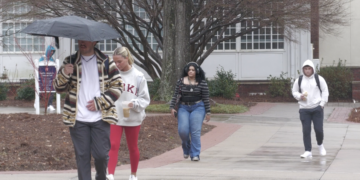
A night out on the Square took a sharp turn from beers and live music to the confiscation of a fake ID, a ride to the sheriff’s office and more than $1,400 paid in fees.
Blair, a senior integrated marketing communications major, was charged with a minor-in-possession and fake ID violation after handing his fake ID to an ABC officer at the former 21+ bar, Rooster’s.
In court, he paid the fine for bail — along with the fee for his violations, lawyer fees and court fees — and participated in community service.
On campus, he said The Office of Conflict Resolution and Student Conduct required him to take a campus alcohol safety class, write reflection papers on his experience and share why he would never make such a “heinous mistake ever again.” He also had to prepare a slideshow presentation on alcohol safety to present to transfer students.
Blair is in the process of having his record expunged before graduation in May, but the time constraints of being a full-time student and state laws have postponed the expungement.He said it could take a year to clear a minor-in-possession charge.
“I guess I wish I knew the extent to which all of this took like out of your life, and the fact that I would have to get it all expunged, and all the process of getting it expunged before I applied for jobs, and all the money that isn’t just bail,” Blair said. “You know, lawyer fees and court fees.”
Blair is just one of hundreds of University of Mississippi students who are arrested each year and are surprised by the range of consequences, according data from UPD.
Most students with criminal offenses are arrested on charges of minor-in-possession, possession of a fake ID, driving under the influence, public intoxication and disorderly conduct, according to Oxford police officers and lawyers.
Oxford DUI attorney Dwight Ball said fake ID charges are common.
“Anyone that’s under 21 years old, it’s almost a sure bet they have a fake ID,” Ball said. “Here’s the phenomena I don’t understand: they keep it with their real ID. There’s students that ask cops which ID they want, and the cops say they’ll take all of them. Or students will drop them, and they’ll reach down to pick them up, and the officer will take them both.”
According to Ball, possession of a fake ID is against the law, and students can still be charged even if they don’t use the ID to buy alcohol or enter a bar.
Records from Oxford Police Department show that in 2019, there have been 464 DUI offenses and 389 other alcohol violations so far, including 281 arrests for public drunk, the most common alcohol violation. On top of that, there have been 442 narcotic related arrests.
“For example, public drunk has been on the book for many decades, and as standard, that’s a fine up to $100, plus cost of court, which makes it $327 and up to 30 days in jail,” Ball said.
According to Oxford Police Department Captain Hildon Sessums, the most costly misdemeanor offense is a DUI. A first offense DUI results in a fine, loss of a driver’s license and mandatory classes.
Defense attorney Jay Carmean added that a DUI offense will also result in the increase of your auto insurance bill.
“In my opinion, DUIs are the most severe misdemeanor offense,” Sessums said. “A DUI offender knowingly puts themselves and innocent people at serious risk when they get behind the wheel under the influence.”
According to Carmean, the fine for a first offense DUI charge in the Oxford Municipal Court is $1,581, and $692 for an MIP or fake ID.
In the city of Oxford, justice court expungements, which essentially remove charges from your criminal record, take a year because the county prosecutor must sign off on it. The justice court judge is not an attorney, which is why the court requires the attorney prosecutor to sign off on it. According to Ball, convictions of moving violations cannot be expunged, but all other misdemeanors can.
According to Carmean, contrary to popular student belief, an attorney is essential to file an expungement.
Expungement only happens for criminal records. For students, their records can not be expunged from the university conduct record.
According to Tracy Murry, the director of the Office of Conflict Resolution and Student Conduct, the university is required by the federal government to keep records for seven years. Typically, students applying to law school or medical school will be asked to disclose this information to the school, but it is the students’ decision to release their records.
“A lot of people get confused because it seems like you’re going through two systems at the same time,” Murry said. “We handle policies and only policy violations; the court handles law. But a lot of times (students) feel if a matter is dropped in the court system, or if a case has been expunged, it should be with us. We don’t communicate with the court system, so we wouldn’t know that, so we’re still going to meet with the students and have that conversation with them. Expungement sort of, in some cases, means you’re guilty. You’re just having it erased from your record.”
The Office of Conflict Resolution and Student Conduct uses the policies from the University Conduct System Authority and Jurisdiction to examine each case to determine whether it falls under the jurisdiction of the university and if they should handle it.
“For the city of Oxford, which is what most students are referring to, if they’re talking about alcohol arrests, then we do all handle those,” Murry said.
Aside from the financial costs, time commitments and a potential record, Blair added that the emotional toll his arrest had on him and his family was difficult.
“Honestly, calling my mother was probably the worst part about it,” he said. “Then it sucked more because then I had to let her know that she had to help me pay back the people who bailed me out, and it was money that my family didn’t have, so that was all stressful and that made me feel worse.”





































